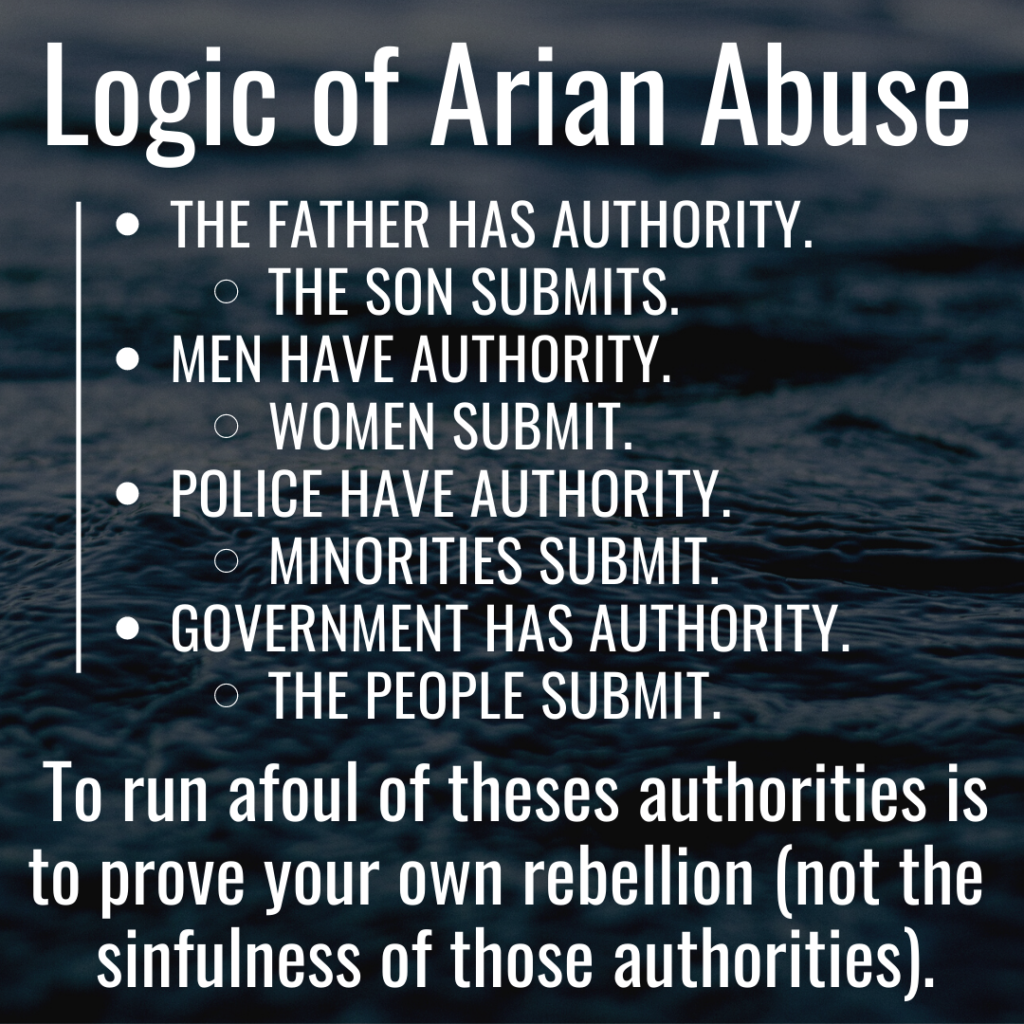Authority.
And Submission.
That is what we are talking about.
Authority and Submission…
- Within God.
- Between the sexes.
- And among the people.
- And a tendency toward abuse.
They are all connected.
Fundamentalist theologian, Owen Strachen, clinging to his biblicism, has again defended his version of the Arian heresy. While denying it, Strachan is saying that Jesus the Son is inferior to the Father.
First on Biblicism (then on to abuse)
We often think that early church heretics were against the Bible. But that isn’t true. Heretics usually came to their heresy through a lopsided, wooden, literalistic commitment to the Bible. What we now call biblicism.
Biblicism, as Michael Bird defines it, is
“…an approach that regards the Bible as the exclusive source for formulating Christian belief and practice with explicit rejection of the need for historical background, garnering wisdom from wider tradition, recognizing the influence of one’s cultural location.”
Biblicism is the idea that you can just read the Bible without reference to historical context or theological reflection. It believes that it is easy to come up with all your beliefs.
But the early church didn’t just read the Bible.
They experienced the saving presence of Jesus.
And they read the Bible through that experience of Jesus—just like Jesus taught them to (Luke 24: 25-26, 44-49).
Fundamentalists just read the Bible.
And this reading of the Bible leads them to heresy.
You can see this happening with Strachan because he lists verse after verse that he thinks supports his position that the Son acts in submission to the Father who has all the authority. But doesn’t understand what he is reading in those verse because he doesn’t hold together the two natures of Jesus (fully God and fully human).
He comes to his heretical position (which he claims is biblical) because he attempts to just read the Bible, instead of read the Bible through Jesus.
For those wanting a deep dive here is a list of posts:
- Don’t Crash the Trinity: The Form of God and Form of a Servant
- Eternal Submission? Thinking (all the way) Through the Issue
- How The Trinity Makes a Decision
- Three Failing Strategies Being Used to Redefine the Trinity
Also, if you are feeling the need to deconstruct fundamentalism, check out this short course on 5 shifts to make to leave fundamentalism.
Arianism and Abuse

Strachan holds to a Arian, or semi-Arian, view of God because he claims that one member of the Trinity has more authority (the Father) than another (the Son). And that one member for Trinity must submit more (the Son) than another (the Father).
He claims they are still equal.
But they aren’t.
One member of the Trinity clearly holds the power, the “authority” as Strachan claims.
One member of the Trinity doesn’t have the power, the one who “submits” (the Son).
Every time you talk of authority and submission you are talking about power. It is unavoidable.
Now I read a Bible where authority is always giving itself away.
- God hands over creation to his image bearers, giving them authority in all things.
- And when we screwed it up God does not demand obedience again, but entered as a SLAVE (Phil. 2:7) and became obedience himself (he who was Master would rather become a Slave than forcefully assert his rights as Master, so that all could be free and become children of God).
- That is the story I read.
But Strachan seems to read a Bible where authority and submission are central, and they should never be confused.
And this “Arian” view is fertile ground for apathy and abuse.
From this fundamentalist, and white male theologian, to the pastors conferences people like him plan, to the pastors they teach, and then to the people these ideas of authority and submission take shape and create a culture, a culture of expected deference to authority by “equal” people who are nonetheless expected to be “submissive”. And this expectation of submission to authority then blames the victims who are abused by their “authority”, whether it be a husband, a pastor, or a police officer.
The Logic of Arian Abuse:
- The Father has authority.
- The Son submits.
- The Son submits.
- Men have authority.
- Women submit.
- Women submit.
- Parents have authority.
- Children submit.
- Children submit.
- Police have authority.
- Minorities submit.
- Minorities submit.
- Government has authority.
- The People submit.
To run afoul of theses authorities is to prove your own rebellion (not the possible sinfulness of those authorities).
Frankly, I am angry that white fundamentalist theologians are so numb, ignorant, or blind to the fact that these ideas of “authority/submission” are continually used to denigrate women and minorities as they hide behind walls of biblicism. It is not enough to say “We are trying to be biblical” when those made in God’s image are being abused by those in “authority”, especially when the Son—who is the very Image of God—would rather die so that all might live.
Deconstructing Fundamentalism
I believe that much of what is going under the banner of deconstruction these days is really people coming to terms with the distortion and abuse caused by the fundamentalist version of Christianity.
Thankfully, this fundamentalist view of Christianity is only one recent (and hopefully fading) version.
For a rapid detoxing of fundamentalism, see my Deconstructing Fundamentalism without Destroying Faith course that focuses on 5 shifts out of a modern fundamentalism back into the richness of an ancient, embodied faith.
[The firmness—some might even think harshness—of this post comes from several sources. First, Strachan comes from and speaks to “my people” (fundamentalist-evangelicals). Second, I am a theologian and pastor rebuking a fellow theologian/teaching for his public comments. Third, I believe views like Strachan are a false witness of the church and is causing many to walk away from the faith—or to deconstruct.]
Disrupt the social media algorithms by signing up for my posts directly. Sign up here, or on the side bar (below on mobile / above for computers).


One reply on “On Biblicism, Arianism, and Abuse”
I appreciated that you provided a link to the article by .Owen Strachen. Having read that article, I must strongly disagree with your take on his position. First, he most unequivocally denies Arianism and semi Arianism. His view is one that all three members of the Trinity are ontologically the same, and absolutely equal in power and glory. The distinction he makes is more one of function and role in relationship to one another.
He doesn’t use this analogy himself, but one that might be helpful is the idea that when we have children they are equally of the same essence as the parents. They are made in the image of parents, and they have all of the essential qualities of humanity. There is no greater value of one over the other; nevertheless, there are different roles between parents and children.
As you noted, he cites numerous texts in support of his position, and numerous theologians who support his position. I can’t see anything oinsound in his approach. And while I agree with you that we cannot take the Bible in a wooden fashion without reference to its culture, I don’t see that happening in any of the statements he made. It feels like you have painted him with the brush strokes of wooden literalism, and then made a leap from his concept of submission to its abuse without in any way explaining how the two are necessarily linked.
Another analogy may be helpful. There are many times in life where I submit to the wisdom of my wife, and there are times when she submits to me. This does not mean that there is any difference in our value or essence, but simply a matter of function in any given situation. And this this kind of mutual respect is something that can happen whether one is a complementation or an egalitarian. By the same token, abuse can also occur in either relationship.